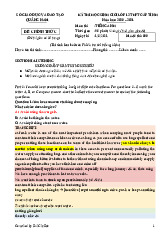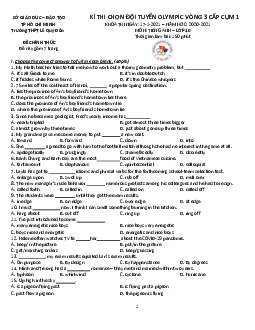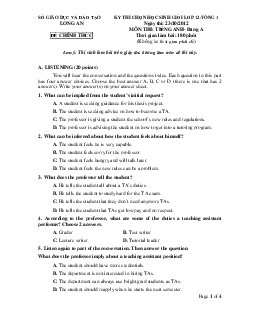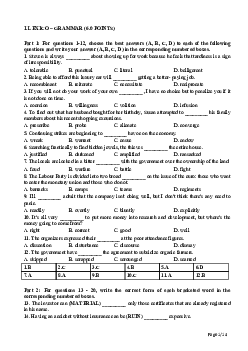





Preview text:
ENGLISH BONANZA
KỲ THI CHỌN HSG KHỐI 12 THPT NĂM HỌC 2021 – 2022 (Đề gồm 6 trang) MÔN THI: TIẾNG ANH
Thời gian làm bài: 150 phút (Không kể thời gian giao đề)
SECTION A: MULTIPLE CHOICE QUESTION (16 pts):
I. Mark the letter A, B, C or D on your answer sheet to indicate the word whose underlined part is pronounced
differently from the rest. 1. A. dual B. duet C. duty D. during 2. A. unclear B. unfounded C. unanimous D. unable 3. A. equation B. information C. foundation D. conservation
II. Mark the letter A, B, C or D on your answer sheet to indicate the word that differs from the rest in the position of the main stress. 4. A. police B. polish C. poem D. policy 5. A. informative B. mesmerizing C. alternative D. economy
III. Mark the letter A, B, C or D on your answer sheet to indicate the correct answer to each of the following questions.
6. He was arrested _____ suspicion _____ murder. A. in/of B. on/with C. at/for D. on/of
7. _____, we should be in Japan by 4 p.m. A. With luck B. At luck C. By luck D. In luck
8. Thomas has a garden which is _____ mine. A. double as large B. semi-larger than C. twice as large as D. as two-time as large
9. You thought I did wrong but the result _____ my action. A. agreed B. approved C. proved D. justified
10. She was convicted of murdering her _____ and allegedly violent husband. A. drunk B. drinking C. drunken D. drink
11. _____ speaking, I don’t like my present job at all. A. Merely B. Frankly C. Additionally D. Honorably
12. Company policy states that, upon arrival, all employees are _____ at the form desk.
A. going to have to sign in B. having to sign in C. signing in D. to sign in
13. The new office block _____ well with its surroundings. A. blends in B. stands out C. shares up D. sets off
14. Last month's bad weather was responsible for the _____. A. crop failure B. crop fail C. failure crop D. failing crop
15. Having been working hard for a year, Liz is enjoying her own _____ holiday. A. well-informed B. well-earned C. well-paid D. well-being
16. I think his idea _____. A. worked as a treat B. was excellent treat C. work a treat D. is being treat
17. _____ one after another, parallel computers perform groups of operations at the same time.
A. Conventional computers, by handling tasks
B. Since tasks being handled by conventional computers
C. Whereas conventional computers handle tasks
D. While tasks handled by conventional computers
18. The football match was televised _____ from the National Stadium. A. alive B. living C. lively D. live
19. Only _____ Brown would drive a car like that. A. an B. the C. a D. No article
20. She was asked to _____ the details of the conversation to the court. A. retell B. react C. recount D. report
21. I can accept criticism in general but Martin _____ it too far, so I had no option but to show my disapproval. A. push ed B. carried C. made D. put
22. The restaurant is very popular with film stars, artists and the _____. A. like B. such C. same D. similar
23. Can you _____ me to your parents when you come home? A. remind B. recall C. remember D. review
24. Many of the current international problems we are now facing _____.
A. linguistic incompetencies
B. are because of not understanding themselves
C. lack of the intelligent capabilities of understanding each other
D. are the result of misunderstanding
25. With three days to _____ before the high school graduation exam, he had to digest such a lot of facts. A. go B. come C. remain D. spare
IV. Mark the letter A, B, C or D on your answer sheet to indicate the most suitable response to complete each of
the following exchanges.
24. “What do you think of the film we’ve just watched?” “__________” A. It’s a breeze.
B. None of your business! C. I’ve seen better. D. No kidding!
25. “Which do you prefer: salted butter or unsalted one?” “__________” A. Nonsense! B. Anything will do. C. It’s on me. D. You’re the doctor.
26. “Do you have the time?” “__________” A. My watch has broken. B. It’s about five. C. Never mind!
D. I’m quite free now.
V. Mark the letter A, B, C or D on your answer sheet to indicate the word(s) or phrase(s) CLOSEST in meaning to
the underlined word(s) in each of the following questions.
27. I only have time to tell you the main idea of it, not the details. A. twist B. gist C. list D. fist
28. Relaxation therapy teaches one not to fret over small problems. A. worry about B. get angry about C. get involved in D. look for
VI. Mark the letter A, B, C or D on your answer sheet to indicate the word(s) or phrase(s) OPPOSITE in meaning
to the underlined word(s) in each of the following questions.
29. The real meaning of the poem was obscured by the pretentious language in which it was written A. apparent B. hidden C. adopting D. transparent
30. We could never get ready for the test at short notice. A. in good time B. if time permits C. in next to no time D. in our own time
VII. Mark the letter A, B, C or D on your answer sheet to show the underlined part that needs correction in each of
the following questions.
31. Many professors of economics and history at Atlanta University actively fought for full racial equation, justice and democracy all over the world. A. of economics B. Atlanta University C. fought for D. equation
32. The reason he wants to take a leaving of absence is that he needs a complete rest. A. take B. leaving C. that D. complete test
33. My uncle has been working as a coacher̉ at a fitness center in Hanoi for five years, so his body is impressively muscular. A. has been working B. coacher C. a fitness center D. muscular
34. Le Loi school is the school to which I’ve been familiar since my childhood. A. Le Loi school B. to which C. familiar D. my childhood
VIII. Read the following passage and mark the letter A, B, C or D on your answer sheet to indicate the correct
word that best fits each of the numbered blank.
Sharks have gained an unfair reputation for being fierce predators of large sea animals. Humanity's (35) _____
fear and hatred of these ancient creatures is leading to a worldwide slaughter that may result in the extinction of many
coastal shark species. The shark is the victim of a warped attitude of wildlife protection; we strive only to protect the
beautiful, non-threatening parts of our environment. And, in our efforts to (36) _____ only non-threatening parts of our
earth, we ignore other important parts.
A perfect illustration of this attitude is the contrasting attitude toward another large sea animal, the dolphin.
During the 1980s, environmentalists in the United States protested the use of driftnets for tuna fishing in the Pacific Ocean
since these nets also caught dolphins. The environmentalists generated enough political and economic pressure to prevent
tuna companies from buying tuna that had been caught in driftnets. (37) _____ this effort on behalf of the dolphins, these
same environmentalists have (38) _____ very little to help save the Pacific Ocean sharks whose population has decreased
nearly (39) _____. Sharks are among the oldest creatures on earth, (40) _____ in the seas for more than 350 million years.
They are extremely efficient animals, (41) _____ wounded or dying animals, thus (42) _____ an important role in nature
of weeding out the weaker animals in a species. Just the fact that species such as the Great White Shark have managed to
live in the oceans or so many millions of years is enough (43) _____ of their efficiency and adaptability to changing
environments. It is time for us humans, who may not survive another 1,000 years at the rate we are damaging the planet,
to (44) _____ our fears and begin considering the protection of sharks as an important part of a program for protection of
our entire natural environment. 35. A. unclear B. unfounded C. incredible D. unbelievable 36. A. restore B. repair C. regenerate D. reactivate 37. A. In contrast to B. By contrast C. On the contrary D. Contrasting 38. A. acted B. made C. taken D. done 39.
A. to the point of the extinction
B. to the verge of extinction
C. to the brink of the extinction
D. to the extent of extinction 40. A. surviving B. to survive C. having survived D. survived 41. A. eating on B. eating out C. feeding on D. feeding out 42. A. adopting B. performing C. casting D. swapping 43. A. justification B. proof C. evidence D. exhibit 44. A. cast away B. fade away C. wear out D. wear off
IX. . Read the following passage and mark the letter A, B, C or D on your answer sheet to indicate the best answer
to each of the questions.
Carnegie Hall, the famous concert hall in New York City, has again undergone a restoration. While this is not the
first, it is certainly the most extensive in the building's history. As a result of this new restoration, Carnegie Hall once
again has the quality of sound that it had when it was first built.
Carnegie Hall owes its existence to Andrew Carnegie, the wealthy owner of a steel company in the late 1800s.
The hall was finished in 1891 and quickly gained a reputation as an excellent performing arts hall where accomplished
musicians gained fame. Despite its reputation, however, the concert hall suffered from several detrimental renovations
over the years. During the Great Depression, when fewer people could afford to attend performances, the directors sold
part of the building to commercial businesses. As a result, a coffee shop was opened in one corner of the building, for
which the builders replaced the brick and terra cotta walls with windowpanes. A renovation in 1946 seriously damaged
the acoustical quality of the hall when the makers of the film Carnegie Hall cut a gaping hole in the dome of the ceiling to
allow for lights and air vents. The hole was later covered with short curtains and a fake ceiling, but the hall never sounded the same afterwards.
In 1960, the violinist Isaac Stern became involved in restoring the hall after a group of real estate developers
unveiled plans to demolish Carnegie Hall and build a high-rise office building on the site. This threat spurred Stern to
rally public support for Carnegie Hall and encourage the City of New York to buy the property. The movement was
successful, and the concert hall is now owned by the city. In the current restoration, builders tested each new material for
its sound qualities, and they replaced the hole in the ceiling with a dome. The builders also restored the outer walls to
their original appearance and closed the coffee shop. Carnegie has never sounded better, and its prospects for the future
have never looked more promising.
45. This passage is mainly about
A. changes to Carnegie Hall
B. the appearance of Carnegie Hall
C. Carnegie Hall's history during the Great Depression
D. damage to the ceiling in Carnegie Hall
46. Who was Andrew Carnegie?
A. mayor of New York City B. a steel mill owner C. an architect D. a violinist
47. The word "extensive" in line 2 could be best replaced by _____. A. fabulous B. thorough C. devoted D. continuous
48. In line 6, what is the meaning of the word "detrimental"? A. dangerous B. significant C. extreme D. harmful
49. What major change happened to the hall in 1946?
A. Space in the building was sold to commercial businesses.
B. The acoustic dome was damaged.
C. The walls were damaged in an earthquake.
D. The stage was renovated.
50. What was Isaac Stern's relationship to Carnegie Hall?
A. He made the movie "Carnegie Hall" in 1946.
B. He performed on opening night in 1891.
C. He tried to save the hall, beginning in 1960.
D. He opened a coffee shop in Carnegie Hall during the Depression.
51. The most important aspect of the recent renovation was probably _____.
A. restoring the outer wall
B. restoring the plaster trim
C. expanding the lobby D. repairing the ceiling
52. The word “they” in line 16 refers to _____. A. sound qualities B. each new material C. builders D. outer walls
53. According to the passage, which of the following is true about Carnegie Hall?
A. After being finished in 1891, Carnegie Hall was well-known as an impressive exhibiting arts hall.
B. Carnegie Hall managed to remain its original structure with hardly any damages.
C. Carnegie Hall was going to be pulled down, which pushed Stern to save it.
D. After the success of Stern’s movement, Carnegie Hall belonged to him.
54. How does the author seem to feel about the future of Carnegie Hall? A. ambiguous B. guarded C. optimistic D. negative
X. Read the following passage and do the following task.
The meaning of volunteering
Volunteering, as some people consider mistakenly is a plethora of people from all walk of life as well as
activities, but data from the other side of the world suggest otherwise. For example, a survey on who participated in
volunteering by the Office for National Statistics (ONS) in the United Kingdom (UK) showed that people in higher
income households are more likely than others to volunteer. In England and Wales, 57% of adults with gross annual
household incomes of £75.000 or more, have volunteered formally in the 12 months prior to the survey date. They were
almost twice more likely to have done so than those living in households with as annual income under £10.000.
As well as having high household incomes, volunteers also tend to have higher academic qualifications, be in
higher socio-economic groups and be in employment. Among people with a degree or postgraduate qualification, 79 per
cent had volunteered informally and 57 per cent had volunteered formally in the previous 12 months. For people with no
qualifications the corresponding proportions were 52 per cent and 23 per cent at all. However, voluntary work is certainly
not the exclusive preserve of the rich. Does the answer not lie perhaps in the fact that the rich tend to have money to allow
them the time to be become involved in voluntary work compared to less well-off people?
A breakdown in the year 2000 of the range of volunteering activities taken from The Australia Bureau of
Statistics gives an idea of the scale of activities in which people are typically involved. Eleven sectors are given ranging
from Community and Welfare, which accounted for just over a quarter of the total hours volunteered in Australia, to Law/
justice/ politics with 1.2 percent at the other and of the scale. Other fields included sport/ recreation, religious activities
and education, following at 21.1 per cent, 16.9 and 14.3 per cent of the total hours. The data here also seem to point to a
cohort of volunteers with expertise and experience.
The knock-on effect of volunteering on the lives of individuals can be profound. Voluntary work helps foster
independence and imparts the ability to deal with different situations, often simultaneously, thus teaching people how to
work their way through different systems. It therefore brings people into touch with the real world; and, hence, equips them for the future.
Initially, young adults in their late teens might not seem to have the expertise or knowledge to impart to others
that say a teacher or agriculturalist or nurse would have, but they do have many skills that can help others. And in the
absence of any particular talent, their energy and enthusiasm can be harnessed for the benefit of their fellow human
beings, and ultimately themselves. From all this, the gain to any community no matter how many volunteers are involved is immeasurable.
Employers will generally look favorably on people who have shown an ability to work as part of a team. It
demonstrates a willingness to learn and an independent spirit, which would be desirable qualities in any employee. So
to satisfy employers’ demands for experience when applying for work, volunteering can act as a means of gaining
experience that might otherwise elude would-be workers and can ultimately lead to paid employment and the desired
field. But what are the prerequisites for becoming a volunteer? One might immediately think of attributes like kindness,
selflessness, strength of character, ability to deal with others, determination, adaptability and flexibility and a capacity to
comprehend the ways of other people. While offering oneself selflessly, working as a volunteer makes further demands on
the individual. It requires strength of will, a sense of moral responsibility for one’s fellow human beings, and an ability to
fit into the ethos of an organization. But it also requires something which in no way detracts from valuable work done by
volunteers and which may seem at first glance both contradictory and surprising: self-interest.
Organizations involved in any voluntary work have to be realistic about this. If someone, whatever the age is
going to volunteer and devote their time without money, they do need to receive something from it for themselves. People
who are unemployed can use volunteer work as a stepping-stone to employment or as a means of finding out whether they
really like the field the plan to enter or as a way to help them find themselves.
It is tempting to use some form of community work as an alternative to national service or as punishment for petty
criminals by making the latter for example clean up parks, wash away graffiti, and work with victims of their own or
other people. Thus may be acceptable, but it does not constitute volunteer work, two cardinal rules of which are the
willingness to volunteer without coercion and working unpaid.
Task 1: Do the following statements agree with the information given in the passage above? Write TRUE
if the statement agrees with the information FALSE
if the statement contradicts the information
NOT GIVEN if there is no information on this
55. There has been an increasing number of volunteers in England and Wales. NG
56.In England and Wales, people with high annual incomes are more likely to get involved in voluntary works than those with low salaries. T
57. Voluntary works have nothing to do with one’s academic performance and social status. F
58. Employers tend to think highly of those who can work independently. F
59. Working as a volunteer requires both mental strength and physical strength. NG
60. Some kinds of community work, which are also considered as voluntary work, can take place of punishments for minor criminals. F
Task 2: Complete the notes below. Choose NO MORE THAN TWO WORDS from the passage for each answer.
61. Those who work as a volunteer can benefit from its profound knock-on effect.
62. Volunteer work can help applicants meet their employers’ demand for experience.
63. Unemployed people can find themselves with volunteering.
64. Some kinds of community work that can be used for minor criminals include tidying up park, washing away graffiti
and work with their own victims.
SECTION B: OPEN-CLOSE QUESTIONS (4 pts):
I. Rewrite the following sentences in order to keep their original meanings (1 pt):
1. No tuition fees are payable in any publicly-maintained school. (CHARGE)
Public-maintained schools do not charge tuition fees.
2. He was suspended for two matches for swearing at the referee. (EARNED)
Swearing at the referee earned him a suspension of two matches.
3. We have been trying to sell our house for over six months. (SALE)
Our house has been for sales for over six months.
4. The idea no longer interests her. (OFF)
She has gone off the idea.
5. All that stood between John and a gold medal was his rival’s great speed. (WON)
But for his rival’s great speed, John would have won a gold medal.
II. Paragraph writing (3 pts):
In about 150 words, write a paragraph to answer the following question:
“Nowadays, many students risk cheating on exams regardless of potential consequences. What is the cause of this negative phenomenon?” Marking scheme Total point
1. Address the task (Answering the question) 0.4 Task response
2. Giving relevant main points which are developed and supported. 0.4
1. Organizing the information into a well-structured paragraph with topic 0.4
sentence, supporting sentences and concluding sentence. Unity, Coherence and
2. Major supporting ideas are developed and progressed with relevant 0.4 Cohesion
explanation, clarification, or examples.
3. Using a wide range of linking/cohesive devices. 0.2
1. Using a wide range of vocabulary. 0.4 Lexical resource
2. Using less common lexical items. 0.2 Grammatical range
1. Using a wide range of sentence structures and grammar tenses. 0.4 and accuracy
2. Paying attention to punctuation, spelling, and handwriting. 0.2 Total: 3.0 -----THE END-----




